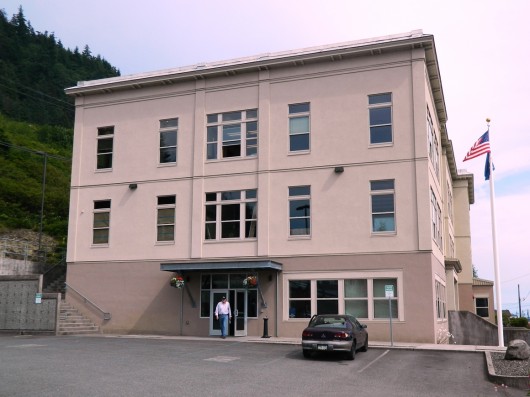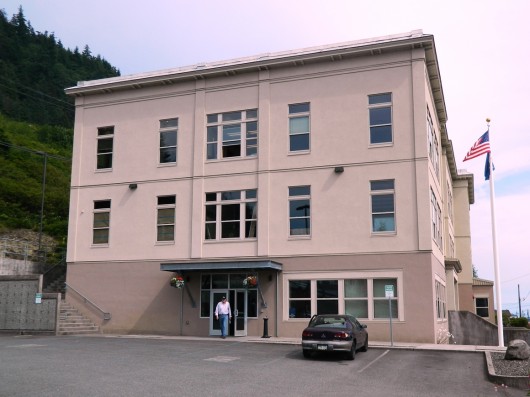In a split vote Monday, the Ketchikan Gateway Borough Assembly approved an ordinance providing $144,000 now to OceansAlaska, and directing the borough manager to start negotiating a loan of $600,000 to the struggling shellfish seed producer.
Remember the wooden bowls? OK, that was a long time ago. How about the veneer mill?
If you look up some of the economic development projects that the Ketchikan Gateway Borough has funded, you’ll find some lemons. That’s one concern. The other is that this project – OceansAlaska –has a recent history of mismanaging funds provided by the borough.
So, you can probably understand the hesitation.
Here’s Assembly Member Glen Thompson, who said the borough shouldn’t jump in where the free market fears to tread: “I’m going to tell you a story of what’s going to happen with this. You’re going to give then $600,000, and in about three or four years, they’re going to come back and say, ‘Ooh. We almost made it, but we need another $200,000.’”
And Mike Painter, who said he can’t just forget about OceansAlaska’s history, and how it’s changed missions several times: “The sustainability of the operation – they shifted gears from an aquarium to a learning facility. Now we’re going to try producing seed.”
And here’s Bob Pickrell speaking during public comment, and challenging the Assembly to think with their own wallets, in addition to the taxpayers: “Let’s play this game tonight. Each one of you write a check; a personal check — let’s say for $5,000 — and put that in front of you before you take that vote. When you take that vote, if it’s a yes, you’re going to give it to OceansAlaska for seed money at exactly the same terms that you’re going to spend the taxpayers’ money: 4 percent interest, payable back starting in 2019.”
Assembly Member Alan Bailey agreed that the borough doesn’t have a good track record when picking economic proposals to support. But, he talked his way around to supporting the ordinance:
“I just want to say, this is an economic development fund,” he said. “What is the purpose of that fund, what are we to use it for, if not for attempting to create an economic environment for the community?”
And here’s Assembly Member Bill Rotecki, a former board member of OceansAlaska, who continues to support the nonprofit’s goals: “Southeast Alaska is in a unique position to have a strong and thriving mariculture industry. And if you look at where it’s happened around the world, the venture capital didn’t do it. It was a kick from the local governments. And in most cases, a lot more aggressive than this.”
OceansAlaska produces oyster and geoduck seed for Alaska shellfish farmers. That seed is in high demand, but OceansAlaska is in a financial mess.
The nonprofit has debt that it can’t pay, and officials publicly admit that a previous borough loan was misappropriated. The board of directors is new, though, as is the staff. They’ve come up with a new business plan, hired a bookkeeper and say they’re dedicated to making the organization viable.
But they need money to make that happen. And they say if the borough invests in OceansAlaska, those public funds will come back in the form of a loan repayment, and economic support for local mariculture startups. Peter Metcalf is vice president of the new OceansAlaska board.
“One thing I can say about the board of directors is that we’re all business people and we’re all into this kind of thing – to try to make it a clean operation that’s not dependent on grants and loans, but is making money,” he told the Assembly. “We believe that it can. A couple of us have made investments, in the sense of paying off debt.”
Assembly Member Todd Phillips spoke in support of the measure, and reminded his colleagues that risk sometimes pays off.
“No risk no glory,” he said. “We can look at the shipyard. If we didn’t help put money there – (look) where they are today. So there are positives to the negatives.”
The ordinance passed in a 5-2 vote. Painter and Thompson voted no.
With that ordinance’s passage, the borough agrees to provide a $144,000 grant to OceansAlaska in the short term. Borough Manager Dan Bockhorst then will investigate a $600,000 loan to OceansAlaska from the borough’s economic development fund. That loan would be paid out to OceansAlaska over five years, and paid back over 20 years.
If the loan is successfully negotiated, the grant will be rolled into that amount.
In other business, the Assembly voted 6-1 to reinstate non-areawide funding of about $400,000 to the city-owned Ketchikan Public Library. Painter voted no.
On a related topic, the Assembly declined to give four-hands direction to the borough manager to investigate a proposal for the borough to take over library powers from the City of Ketchikan. The brief discussion did, however, lead to some inevitable talk about consolidation of the two primary local governments.
Assembly Member Thompson said if the borough takes over some city powers, it should include more – such as the fire department and the hospital – and it should be done all at once, rather than piecemeal.
Rotecki suggested that the slow approach might work better.
“Warm up to it, have a discussion,” he said. “(It) seems like the obvious one is the fire departments to start with. I’m OK with waiting for it to be brought up by the public, or the city to push it further, to push it back again.”
The community has voted multiple times on proposals to consolidate the city and borough of Ketchikan. It has failed each time.
Also Monday, the Assembly heard concern during public comment about a dog that had been kept in a large wooden box built into a truck bed. Eddie Blackwood, the borough’s animal control director, told the Assembly that his office checked on the dog, which appears healthy, and worked with the owner to establish a better housing situation for the dog. Blackwood said his department will continue to monitor the dog’s welfare.







